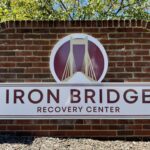Richmond VA Alcohol Addiction Treatment

Are you worried that you, or someone you love, may have a problem with alcohol?
If you’re here, you might be looking for help. And whether that help is for you or a loved one, we are here to offer guidance, care and hope.
Explore the information below to see if the signs and progression align with your experience, and reach out to us at Iron Bridge Recovery Center if it’s time to get some help. We’re here to answer questions and to help put you or your loved one on the path to sobriety.
Alcoholism is Among the Top Five Most Preventable Causes of Death
In fact, 1 in 5 deaths in the US among adults aged 20 to 49 is from excessive drinking. Before you become a statistic, learn where you stand, be honest about your situation, and seek help. You can get better, but you can’t do it alone.
Signs of Alcohol Addiction
If any of the scenarios below are recurrent within the past 12 months, it could be an that you or a loved one is dealing with alcohol addiction:
- Has become unaccountable for his or her employment or parental responsibilities because of drinking
- Hurts himself/herself or others emotionally, physically, or mentally while drinking
- Has become careless about the dangers of driving under the influence of alcohol
- Has been arrested for alcohol-related offenses
…it may be time to consider seeking help for alcohol addiction.
Services:
Treatment:
Recent Posts
How far has it progressed?
Alcoholism is a disease based in the brain. Initially, someone abusing alcohol drinks to achieve the high: feeling relaxed and sleepy, sometimes silly. However, in many cases, the long-term effects of drinking can change the way your brain reacts when you consume alcohol, evolving into a craving for the high. Genetic makeup also plays a factor in your risk of alcoholism.
The following are some of the typical characteristics of a progressed alcohol addiction:
Increased cravings — you need to drink.
Once you’ve started drinking, you can’t stop. You often drink to the point of belligerence, “blackout,” or aggression.
When you stop drinking and start to sober up, you encounter withdrawal symptoms like nausea, sweating, shakiness, and anxiety.
You need to consume more alcohol than you used to in order to achieve the same effects - the “high” your brain craves.
Alcohol Addiction Treatment in Virginia
Although there is no cure for alcoholism, millions of people seek help to achieve and maintain sobriety. Admitting you have a problem is the first step, and the caring team at Iron Bridge is here to help you continue moving forward on the path to recovery.
During intake, we’ll learn your health history, the depths of your addiction, and your individual circumstances and preferences. From here, we’ll build a customized program that will help you detox, deal with challenging withdrawal, learn how to combat triggers and avoid relapse, and life skills needed to create a strong forward path while you do the work necessary to earn back trust with your loved ones.
How Alcoholism Affects Families
Alcoholism has been called a “family disease,” because it affects one out of every four families in America. Often, a loved one’s alcoholism disrupts the entire family dynamic, resulting in long-term damage to the person’s relationship with their spouse, children, or parents.
Unfortunately, children are the ones who suffer the most when a parent misuses alcohol because they are the most vulnerable. Children of alcoholics are at a high risk of long-term psychological and emotional distress, including low self-esteem, loneliness, guilt, feelings of helplessness, fears of abandonment, and chronic depression.
When alcoholism occurs in marriages, it leads to an inability to communicate with one another. This can leave severe strains on the relationship. Research shows that miscommunication in a marriage decreases feelings of trust and unity, which increases the likelihood of divorce.











